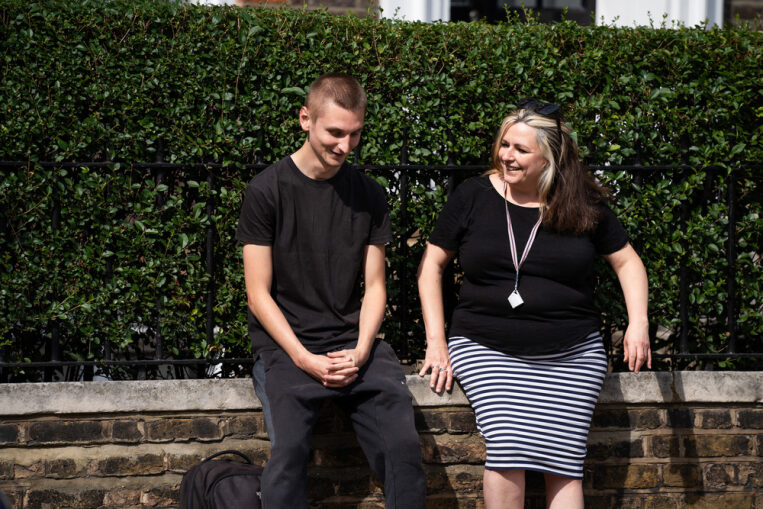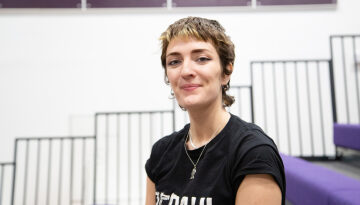Julie King is a Housing Support Worker in the North East. Here she tells us why managing trauma is key to working with young people.
I am a housing support worker in Whitely Bay, which perhaps doesn’t automatically suggest that I work on mental health issues, but at Depaul UK we all do, because we know understanding trauma and how it affects a young person’s mental health is fundamental to supporting them to move forward with their lives.
Most of the young people we work with have faced really difficult starts in life. This might be family breakdown or rejection, poverty, neglect, abuse or exposure to serious substance abuse in the home. Sexual and physical abuse can also be particularly common amongst women. When they arrive, they’re not only traumatised by their past but also their present – they’re often isolated from family and friends, sleeping on sofas or in unsafe places. This kind of trauma shows up in everything – from the way they relate to others, to how they manage day-to-day tasks, or even how they see themselves.
Many of our young people arrive with low self-esteem, no trust in adults or services, and difficulty maintaining routines, relationships, or responsibilities. Some become withdrawn and disengaged, and others turn to substances or chaotic coping behaviours.
Most are not in education or employment. They’re just focused on surviving. You see extreme highs and lows, either buzzing and spending impulsively, or completely flat and unable to engage at all.
We see every one of them and we see their trauma – and that’s why taking a trauma-informed approach is at the heart of our work. This means we purposefully notice how past events influence their behaviour and, crucially, we support them in a way that makes sense for them and meets their individual needs.
When we meet a young person for the first time, our aim is always to prioritise emotional and physical safety first. We don’t just walk in and start filling out forms. We’ve got to build a relationship first otherwise they won’t engage, and they might even walk away from the service – and who could blame them?
We build trust slowly and consistently, we look at behaviour as communication rather than something to fix, and we adapt to the individual instead of expecting them to adapt to us. This safe, consistent connection with a trusted adult can be transformative. But, if we don’t do this, we risk reinforcing the very harm and instability they’ve experienced for years.
Our staff are trained in a range of trauma-informed responses from the four Rs – Regulate, Relate, Rationalise, Repair – to attachment theories, and how to recognise trauma responses. We also work with the Window of Tolerance theory, where a person inside the window can function, think clearly, and respond calmly. But outside the window, they may become overwhelmed or shut down.
One of the young people we work with completely shuts down when she’s dysregulated. There’s no talking, no eye contact, it’s like a blanket goes over her. Rather than pressuring her, we just sit beside her while she plays Minecraft. Sometimes distraction helps, or humour, or just being quiet and present. Eventually she’ll relax, open up, and begin to talk through what’s on her mind. Over time this approach is helping her to self-regulate, a crucial step in long-term recovery.
All of these techniques and tools mean we are well equipped to understand behaviour, build meaningful relationships, and help others process trauma with compassion and clarity. It means we can go beyond surface-level and connect with a young person’s core needs, helping them to feel seen, safe, and supported. It’s not about fixing them. It’s about standing beside them and helping them believe they’re worth the effort.
The impact of this work is often slow and subtle, but deeply meaningful. One young woman we’re working with has been through multiple traumas, was heavily involved in drugs, and had a history of unstable housing. She was using every substance going. It was chaotic. But over time, with our support, she’s got out of an abusive relationship, cut back on her use dramatically, and moved into a stable flat. She’s now preparing to leave our service, ready to live independently, with stronger coping skills and more confidence than when she arrived.
Of course, trauma doesn’t disappear overnight, and healing isn’t linear. It originates in relationships, and it must heal in relationships. If we didn’t take this approach, I don’t think a lot of our young people would stay with us. They’ve had too many people give up on them. We must show them we’re different – because when young people are truly seen and supported, they can begin to rebuild their lives.
Thanks to the Players of the People’s Postcode Lottery, we are supporting thousands of young people at risk of homelessness to build brighter futures.




